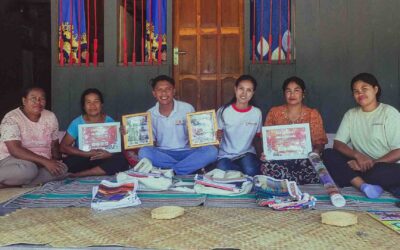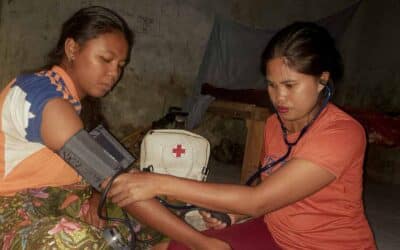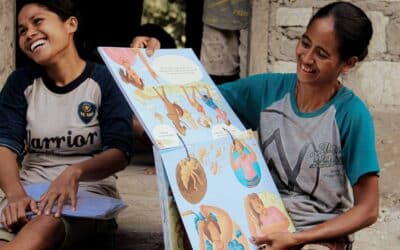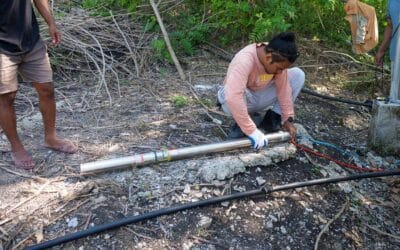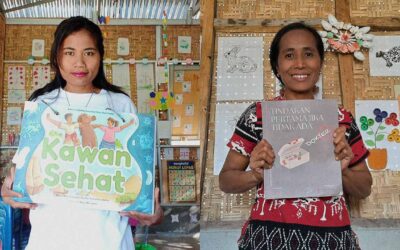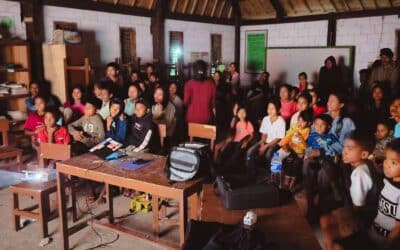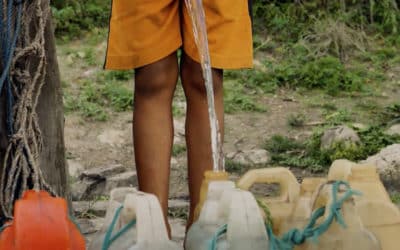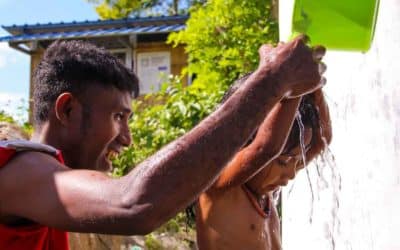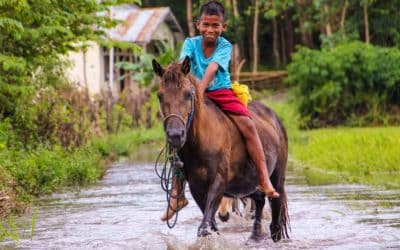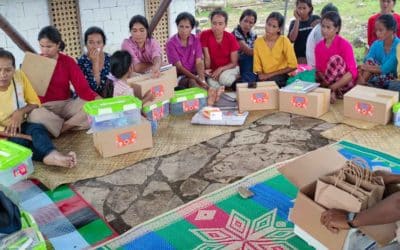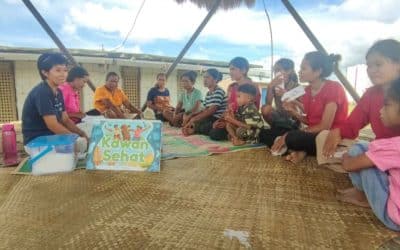In MbinuDita, Kawan Sehat health work began with two women and a backpack. After more than three years as the first call for fevers, wounds and malaria, Agustina and Ferias end their mission, return their equipment and help prepare new agents so village care grows from twenty to thirty trained workers.
Children can't learn effectively in darkness or when suffering from chronic infections. By electrifying schools, improving nutrition, and providing treatment for common illnesses, we create safe environments for learning and development. In this way, education acts as a shield against poverty and social exclusion.
Donate
Support Care
Programs
All projects
Quick News
Field updates
Stories
Field stories
A village in East Sumba where Fair Future implements water and health programs to improve daily life.
Mira a Health Agent Saving Lives in Rural Villages
Mira serves as a Kawan Sehat health agent, delivering medical care to thousands in remote villages. Armed with essential medical supplies, she addresses injuries, manages illnesses, and educates families on improving their health practices—ensuring that healthcare reaches those who need it most.
The joy of children learning to read and write
Taman Baca are transformative spaces where children embark on a journey of exploration through books and stories....
Joyful Learning With Kawan Sehat Book
For those who have a copy, our book Kawan Sehat brings laughter, joy, and education for healthy living, offering...
Quick Pump Repair Restores Water in Mbinudita
Last week, the pump for our Mbinudita Water Connections project experienced a failure due to an electrical short circuit. We responded promptly by repairing the issue and installing a backup pump to maintain water supply continuity. Providing access to water is essential, and ensuring it reaches the community is our highest priority.
Empowering Health Workers with Essential Care Guides
In the remote region of Mbinudita, East Sumba, two dedicated health workers are making a difference through the Primary Medical Care program. Equipped with essential care guides, they deliver life-saving medical care and provide education to thousands. Their impact extends beyond health, influencing every aspect of community well-being. These women are more than caregivers – they are superheroes in their communities.
Matawai the Shades of Water: Mbinudita’s Water Journey
Our documentary, "Matawai de Shades of Water," premiered in the remote village of Mbinudita. The film explores the...
Matawai: Fair Future’s Eye-Opening Documentary on East Indonesia’s Water Crisis
Matawai’ serves as a profound wakeup call to the global community about the water crisis in Eastern Indonesia. Produced by Fair Future Foundation, this compelling documentary vividly portrays the day-to-day struggles of rural families. Through this film, you’ll also witness the groundbreaking initiatives we’ve implemented to transform access to clean water, sanitation, and hygiene education. We invite you to join Fair Future in advocating for universal access to these basic human needs.
A healthier life thanks to the Water Connections program
This new "Picture of the Day" shows a delighted father who can now provide daily showers for his children, thanks to the newly installed water supply. Previously, they could only shower sporadically, sometimes only once a month. Additionally, the photo showcases the new sanitation facilities constructed in Mbinudita. The Water Connections project has successfully installed over forty reservoirs, thirty sanitary installations, three deep boreholes, and more than 15000 meters of HDPE pipes.
Water scarcity can be a significant source of stress for some regions, and various factors can cause it. Arid climates, low rainfall and prolonged droughts are just a few conditions that can contribute to water scarcity. Poor water resource management and a lack of knowledge can also exacerbate this problem, making it even more difficult for everyone to access the water they need to thrive.
Despite these challenges, Fair Future is working hard to address water scarcity and ensure people have access to this vital resource. That is why we have developed the Water Program Connections.
Fair Future and Kawan Baik have noticed a significant improvement in the behaviour of families who have benefited from the "Water Connections" initiative. This program has enabled people to grow gardens, consume healthier food, enjoy life more, reduce stress, and boost energy levels. As a result, there has been a marked decrease in illnesses.
Witnessing these positive changes fills us with joy and reinforces our conviction in our decisions. Fair Future and Kawan Baik Foundation have always aimed to improve individual health, and providing access to safe drinking water is a beautiful way to accomplish this objective. As a Medical Foundation, Fair Future Foundation understands clean water's significance for maintaining good health. Drinking enough clean and healthy water is crucial for various physiological processes, including body hydration, proper organ function, digestion, and elimination of toxins.
Access to clean and safe water prevents dehydration-related illnesses, such as urinary tract infections, kidney stones, and constipation. It also significantly prevents dehydration, particularly in hot areas where sweating and water loss through respiration are common. While water is necessary for maintaining good health, we understand better than anyone else that certain medical conditions may require alternative treatments.
Happy to have water without going far to get it
This new "Picture of the Day" shows you a 12-year-old kid named Yaspan. He was born in a tiny village in East Sumba where Fair Future and Kawan Baik have worked for over four years. We built a new school for him a few years ago, #sdmbinudita, and now he and his family have clean water reaching his house, which was not the case before. Yaspan and all his friends from the Village of Mbinudita are lucky because children struggle to get water everywhere else. They have to find it very far on foot; to do this, they miss school, get injured, and fall ill.
There's something inexplicably satisfying about the heavy rains in ultra-rural East Sumba, especially when you live in a water-scarce area: The sound of raindrops hitting the roof is soothing, and the smell of wet earth is refreshing; plus, you feel good because you know that this rain will help the family. When it rains a lot, kids and families here can't help but be happy knowing that their water tanks will be filled and they won't have to worry about running out of water for a moment.
"-It's a small blessing for which I am grateful, and I always make sure to take advantage of the rain while it lasts…" a friend from the village told me last month.
Heavy rains like the ones we experienced last month in one of the ultra-rural villages in East Sumba, where we work with Fair Future and Kawan Baik Indonesia foundations, are also an opportunity to celebrate as these kids wade through the water. They are the first to be happy because they won't have to walk for hours to fetch water far from home.
With those heavy rains comes plenty of water and the relief of much-needed hydration. The floods will provide much-needed food for crops, wash livestock and provide villagers with general water and sanitation assistance. With the bonus of increased economic activity and improved social well-being from the new abundance of water, these small floods are becoming the opportunity of a lifetime for the villages of Sumba. With increased water storage, a healthier environment and better living conditions, small floods caused by heavy rains are the perfect way to improve the lives of villagers in these areas where water is absent.
It's interesting to consider that what may be a challenge for many of us is a helpful solution for these families.
Evaluation of 8 Kawan Sehat agents, in Mbinudita
In the village where it all started for us: The #rebuildmbinudita program is the construction of a school, and the construction of a drinking water network for more than 2700 people, 60% of whom are children under 12 years old . It is really the (re)construction of an entire village or learning to live healthier, healthier all together, within the framework of the creation of innovative programs. Access to primary medical care is part of this program here in Mbinudita and it is only natural that we have included it in this Care program.
PMC program pre-assessment in Mbinudita
Fair Future teams examine and investigate more than two hundred cases of various illnesses or injuries treated under the primary medical care program by health workers. We also take stock of what will happen next week to accurately assess the supply of new equipment, drugs and medical devices. We also tell them that three will be part of a “test” screening program for high blood pressure and, in this case, the “prescription” of treatment and an appropriate medical procedure.



